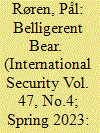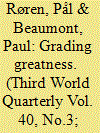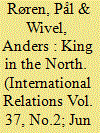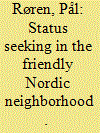|
|
|
Sort Order |
|
|
|
Items / Page
|
|
|
|
|
|
|
| Srl | Item |
| 1 |
ID:
191600


|
|
|
|
|
| Summary/Abstract |
Do states get higher social status from fighting? The prestige of war depends on the type of “status order” that it is interpreted in. Status orders condition and enable the pursuit and recognition of status within social clubs of world politics. Depending on the status order, social clubs may either value or stigmatize belligerence. An analysis comparing the status recognition that Russia received in three social clubs (the great power club, the G-8, and the UN Security Council) after it annexed Crimea and invaded eastern Ukraine in 2014 explores this assumption. The analysis shows that war generated different status effects on Russia's status within each of these clubs. Contrary to popular belief, and amid widespread condemnation, Russia was increasingly recognized as a great power within U.S. public discourse. In contrast, Russia's belligerence diminished its status within the G-8 and had little effect on its status in the UN Security Council. The findings underline the importance of context in estimating status effects of participating in wars and any other behavior that might impact a state's standing in world politics.
|
|
|
|
|
|
|
|
|
|
|
|
|
|
|
|
| 2 |
ID:
164821


|
|
|
|
|
| Summary/Abstract |
An impressive portfolio of case-study research has now demonstrated how and through what means the BRICS (Brazil, Russia, India, China, South Africa) countries have sought higher social status. However, this field of research lacks systematic means of evaluating this status-seeking. This article fills this lacuna by developing a mixed-methods framework enabling scholars to zoom in and compare individual states’ relative status performance. Using diplomatic representation as a proxy for status recognition and comparing it to a country’s status resources (wealth), the framework indicates how successfully countries have generated recognition from the international society. The findings show that China’s economic ascent has been matched by increased recognition, and that South Africa enjoyed an almost immediate ‘status bounce’ following apartheid, turning it from a pariah to a significant overperformer. Russia should be understood as an ‘overperforming status-dissatisfied power’ while India’s status performance has been around ‘par’ for a country of its economic resources. Lastly, Brazil underperforms more than any of the other BRICS, especially since its democratic transition. The findings highlight considerable variance in the type and duration of gaps between status resource and recognition and suggests that rather than treating these as ‘inconsistencies’ awaiting correction, they can and should be accounted for by case study analyses.
|
|
|
|
|
|
|
|
|
|
|
|
|
|
|
|
| 3 |
ID:
191959


|
|
|
|
|
| Summary/Abstract |
The Scandinavian states’ pursuit of status in world politics is well documented. However, little is known about whether these endeavors have resulted in higher status for these states. In this article, we suggest that the Scandinavian countries represent a useful case to explore whether similar foreign policy profiles and common club membership equalizes or exacerbates the unequal distribution of status recognition in world politics. To measure the status recognition of Sweden, Denmark, and Norway, we use a network centrality measure of diplomatic representation and exchange from 1970 to 2010. We also measure how well the states have performed to increase their status recognition given their available status resources (measured by military capabilities and wealth) and their status-seeking effort (measured by relative diplomatic outreach). Our results show that Sweden has received significantly more recognition and performed much better than both Denmark and Norway in the measured period. We offer three explanations for these developments. First, the spoils of seeking status using the Scandinavian brand is akin to a regional zero-sum game in which Sweden, as the most visible state of the three, is the main beneficiary of the status recognition in the direction of the club. Second, status recognition often lags achievements or increases in status resources because the beliefs of foreign policy practitioners are only updated sporadically. This status lag is especially visible when states struggle to convert their resources into status (Norway), or when they succeed in maintaining their status despite experiencing a drop in status resources (Sweden). Third, an increase in status resources will only influence status recognition if it plays into a corresponding narrative. Sweden, in contrast to the nouveau riche Norwegians, has managed to rearticulate its foreign policy in a way that has attracted recognition in world politics.
|
|
|
|
|
|
|
|
|
|
|
|
|
|
|
|
| 4 |
ID:
170756


|
|
|
|
|
| Summary/Abstract |
The article argues that the way status is pursued in social groups in world politics is contingent on the type of social relations that constitute interaction between the members. The Nordic region is a group of countries marked by friendship and trust. Here, the numerous societal linkages between the Nordic countries have made their region into a ‘friendly neighborhood’. This has changed the way that these countries pursue status. To explore this status dynamic, the article draws on a series of interviews with Nordic diplomats and argues that a strong friendship both enables collective status seeking, and constrains individual status seeking. Specifically, turning their social group into a friendly neighborhood allows the Nordic countries to posture as a collective polity and seek status on behalf of it. This grants them more status recognition in world politics. Moreover, friendship does not eliminate status rivalry, but it does turn it into a friendly kind of status competition. Indeed, while the intra-regional intensity of the competition endures, the article finds that the Nordic countries are unlikely to compete in ways that might harm their friendship or their neighborhood.
|
|
|
|
|
|
|
|
|
|
|
|
|
|
|
|
|
|
|
|
|